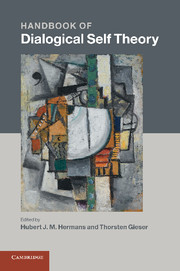Book contents
- Handbook of Dialogical Self Theory
- Handbook of Dialogical Self Theory
- Copyright page
- Contents
- Figures
- Tables
- Contributors
- Epigraph
- Introductory chapter
- Part I Theoretical contributions
- Part II Methods for studying the dialogical self
- 13 Dialogicality and personality traits
- 14 Spatial organization of the dialogical self in creative writers
- 15 Cognitive architecture of the dialogical self: an experimental approach
- 16 Voicing inner conflict: from a dialogical to a negotiational self
- 17 Narrative processes of innovation and stability within the dialogical self
- 18 Methodological approaches to studying the self in its social context
- Part III Domains of application
- Epilogue
- Index
13 - Dialogicality and personality traits
from Part II - Methods for studying the dialogical self
Published online by Cambridge University Press: 05 June 2012
- Handbook of Dialogical Self Theory
- Handbook of Dialogical Self Theory
- Copyright page
- Contents
- Figures
- Tables
- Contributors
- Epigraph
- Introductory chapter
- Part I Theoretical contributions
- Part II Methods for studying the dialogical self
- 13 Dialogicality and personality traits
- 14 Spatial organization of the dialogical self in creative writers
- 15 Cognitive architecture of the dialogical self: an experimental approach
- 16 Voicing inner conflict: from a dialogical to a negotiational self
- 17 Narrative processes of innovation and stability within the dialogical self
- 18 Methodological approaches to studying the self in its social context
- Part III Domains of application
- Epilogue
- Index
Summary
Keywords
- Type
- Chapter
- Information
- Handbook of Dialogical Self Theory , pp. 241 - 252Publisher: Cambridge University PressPrint publication year: 2011
- 11
- Cited by

